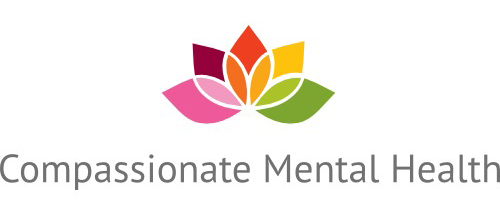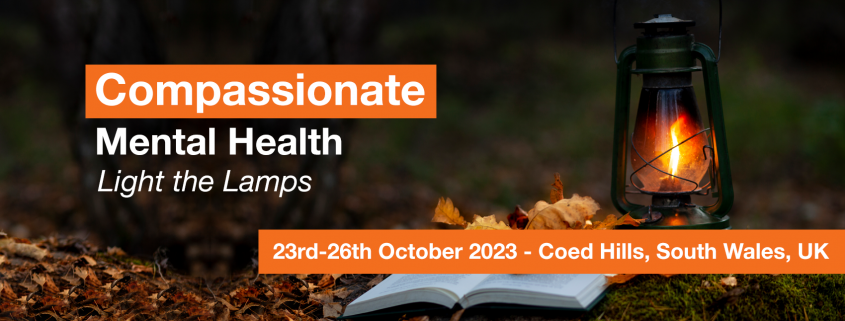Towards Compassionate Mental Health by Brigid Bowen
30 years ago I walked into hospital as a voluntary patient in the middle of a manic episode.
Some months later, I came out with a walking stick, Parkinsonian Dystonia and practically mute.
At the time of my hospitalisation I’d been doing well at university, but it’s safe to say my head had been blown by a mixture of post-colonial literary theory, anti-depressant withdrawal, recreational drug taking, missing home cooked food and a strong Ayurvedic detox.
A potent cocktail.
I’d also recently won two big theatre roles – one at Sussex University where I was an undergraduate, and the other at a Rep company in Brighton where I’d got a lead role in a Greek tragedy. I was excited about starting rehearsals the following week. I went into hospital clutching my copy of Women of Troy – the part of Hecube underlined. I thought it would be a good time to rest and learn my lines. I thought I’d be out in a week.
But I never got to make that first rehearsal. My polite refusal of the drugs at medication trolley time, led to me being offered a private room (how kind, I’d thought) and put on a locked ward and under a Section 3 of the Mental Health Act.
I never acted again, despite having been theatre-mad since a kid.
Acting Out
I was pretty out there – wearing pants on my head, quoting French deconstructionists and subverting my MDT assessment by sitting cross-legged on the floor in the centre of the 12 mental health professionals and doing performance theatre – miming with a Munch like scream the lockjaw I’d got after the doctor failed to prescribe side effect pills to go with the anti-psychotics that had kept me sedated at home.
I may have sectioned me too.
Unbalanced, lacking in boundaries and respect for social norms. But that’s what I’d been being taught for the past year of studying with one of the world’d leading post-colonial theorists – that power could be subverted, and cultural change always comes from the fringe – from that state of liminality where madness and possibility are easy bedfellows.
Studying Fanon, Foucault, Kristeva and Derrida taught to challenge societal norms, and wonder about the values and ideologies of those in authority and power. In contrast to my secondary private girl’s day school education, that had I had to compete to get into, but that I left feeling stupid. I’d gone from being top of my primary school and chuffed to pass the entrance exam to feeling like a failure – from flying high to falling short.
I didn’t fit in, and wasn’t the only one:
“Too much imagination.”
“Don’t ask such difficult questions.”
“Girls like you should do as they’re told.”
For a long time I said that studying postmodernism had sent me mad – that the idea of a world without certainty, full of multiple ways of knowing was too liberating for my mind.
I had deconstructed myself.
On Not Heeding Warnings
My studies had primed me for rebellion. I’d listened to a documentary on BBC Radio 4 the day before my hospital trip, about how under 18s were being given ECT without their parent’s permission.
So when the kindly GP asked me if I’d like to visit the local psych hospital “for a rest,” I was genuinely curious. I imagined myself as a modern day Nellie Bly – undercover in the asylum. But unlike Nellie, I wasn’t just pretending to be mad –
if madness is, as sometimes described, “a state of wild or chaotic activity.”
I remember striding determinedly up the long corridor of the Victorian asylum with a friend of my brother’s following fast behind, pleading with me to turn around and change my mind:
“You don’t know what they’ll do to you,” ….. “I’ve had friends come here before.”
But I wasn’t in the mood for listening. So driven partly by curiosity – but certainly of my own free Will – I made a decision that would change the course of my life.
Changing the Script
30 years of not using psychiatric services, my mental health label or psychiatric medication might not always be an indicator of good health.
I’m aware it’s driven by memories of locked doors, face down restraint, unkind staff and the feeling of your soul leaving your body after being forcibly injected with antipsychotics.
I still mourn the girl I was. I wonder who I might have become.
There’s nothing quite like the fear of madness and forced psychiatric treatment to stop you playing offside.
I do sometimes wonder if a chemically enhanced version of myself might have fared better, but fear of getting sectioned again kept me away from mental health services. I found my own paths back to health.
One wise choice was taking time out from my degree to live in a Buddhist community for a year, where I learned to fall in with a community, sharing simple tasks like washing up the dishes and chopping vegetables.
Housing benefit made it possible, and I got to learn self regulation practices that stay with me, and I top up by going on retreat every year.
A little more here.
Breaking Butterflies on a Wheel
There’s more I can say about my experiences, but the stories I encountered during that first time in hospital, and during these past seven years of doing Compassionate Mental Health have far eclipsed my own.
Some stand out. From back then, a beautiful boy aged 18, sectioned to the same ward as me – high and shining. A few weeks later all the shine was gone. Ostensibly walking around, but his inner light snuffed out. Another lad who had been with me on the locked ward. I heard a few years later, he’d escaped hospital and climbed up a power cable. He survived electrocution, but his beautiful face burned and disfigured.
And the woman in her 60s, who had been in hospital since she was young. Her room was next to mine. I would often find her on the floor, sometimes lying in her own urine and excrement. I tried to raise the alarm – called the police, the priest, and confronted staff were in the office, playing games, watching films – or asleep.
One night I found three staff asleep. I still remember pointing:
“You were asleep. And YOU were asleep. And so were YOU …. ”
I remember long conversations with fellow patients. A man being treated with ECT who’d had three major bereavements in as many months, yet no one had asked him about it, let alone offered him psychological therapy.
And there was a 14 year old on our ward – I guess it wouldn’t happen now, who was received multiple ECTS, and was often just sitting, dribbling after his treatments. He became attached to me and would follow me around like a shadow.
Fast forward to the present day and I’m still shocked by the low expectations, lack of imagination and compassion of some present day psychiatric services. So much public money and human potential wasted. Services that do harm as often as good.
I’ve met parents whose children are still in the mental health system, and others who have died there. One age just 16. Most of the parents who come to our Gatherings feel their children have been failed.
And Yet…
There are people who say psychiatry saved their lives. And that’s how it should be.
Distress, psychotic breaks, complex trauma – they won’t disappear overnight. Until we transform society, we must create safety nets that don’t trap people, but catch them when they fall – and set them free again …
Light the Lamps
I’m constantly amazed by the stories we’re encountering, and the people I’m privileged to meet. I have been humbled to be working with some of the world’s top facilitators and trainers, and the most passionate experts by experience and mental health professionals – committed unswervingly to compassionate, relational care.
We are going in the right direction, but we have to go together.
We are gearing up for our 13th Gathering – Light the Lamps
The thread that runs throughout our series of Compassionate Mental Health Gatherings has been building community together – moving beyond Us and Them, the Fixers and those that need Fixing.
I’m from Wales, where we have world leading policies, but don’t yet have the services to match. It’s time to close the gap between rhetoric and the reality on the ground – in Wales, and across the world.
So how can we build bridges between those that use services and those that deliver them, and the family and social network around a person experiencing distress , so everyone can thrive. How can we see mental health as community and cultural practice rather than in individual one?
What does a future-fit, regenerative mental health system look like? And what stops us from building it?
All our Gatherings have themes around finding meaning, connection, building community and mutual support. Those are the things that have helped me in my recovery, and those are the things that don’t cost much to run.
Here’s some background to the project.
Our next Gathering – Light the Lamps, October 23-26 Coed Hills, South Wales, UK
Sign up to the mailing list to be the first to know about future events and trainings
🌱🌱🌱🌱🌱🌱🌱🌱🌱🌱🌱🌱🌱🌱🌱🌱🌱
Compassionate Mental Health CIC does not have core funding, and we need your support.
As with all our gatherings and trainings, sponsors kindly enable us to offer some bursaries for people with personal experience – either of living with mental distress or supporting someone who does – who couldn’t otherwise afford to come.
We can’t do that without your help. Concession places depend on those who support our work, If you would like to consider donating to our bursary fund so that more people on low incomes can benefit, you can give here




Leave a Reply
Want to join the discussion?Feel free to contribute!